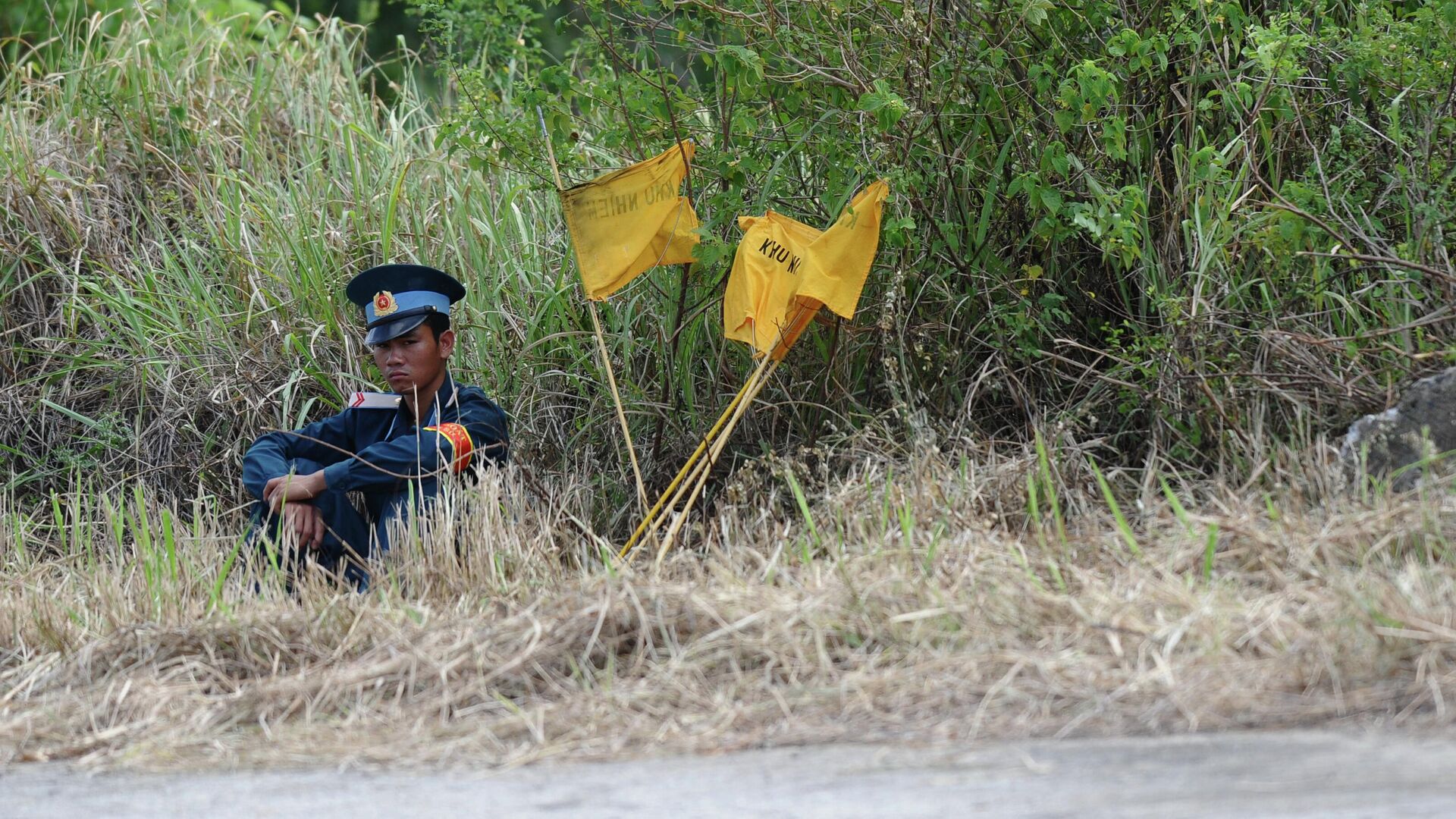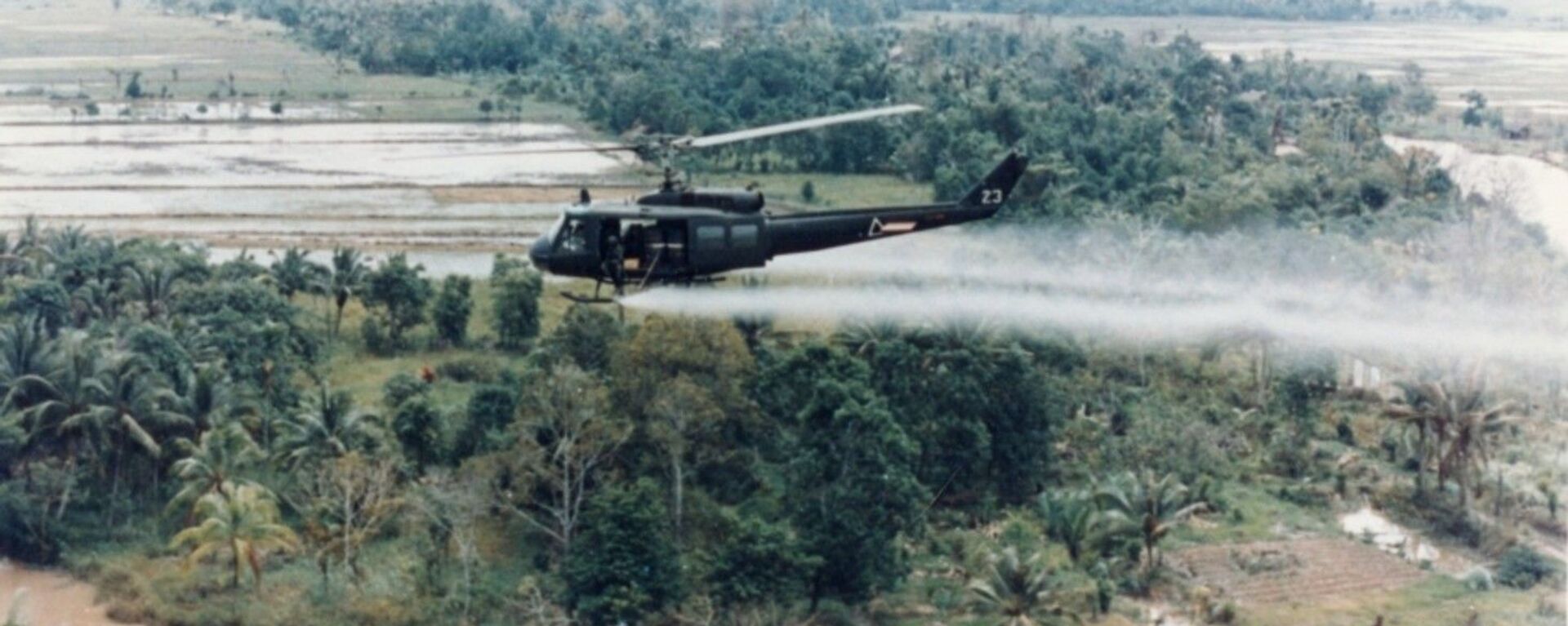https://sputnikglobe.com/20220810/anniversary-of-agent-orange-disaster-only-united-can-we-relieve-the-suffering-of-many-generations-1099447539.html
Anniversary of Agent Orange Disaster: Only United Can We Relieve the Suffering of Many Generations
Anniversary of Agent Orange Disaster: Only United Can We Relieve the Suffering of Many Generations
Sputnik International
The US chemical war in Vietnam was the longest and most catastrophic in human history, lasting nearly a decade. Hanoi has been trying to overcome its... 10.08.2022, Sputnik International
2022-08-10T10:21+0000
2022-08-10T10:21+0000
2022-08-10T12:56+0000
vietnam
agent orange
analysis
https://cdn1.img.sputnikglobe.com/img/07e6/08/0a/1099447392_133:0:3356:1813_1920x0_80_0_0_5ee4da9f14870b5c934fecc0228992b2.jpg
The Vietnam Association for the Victims of Agent Orange/Dioxin (VAVA) plays an important role in efforts to deal with the consequences of the US’ inhumane war. It has been helping victims of Agent Orange and representing their interests in the fight for justice for more than 18 years.In an interview with Sputnik, Lieutenant General Dr. Dang Nam Dien, VAVA’s vice president and secretary general, explained that, “Over the past 18 years, VAVA has raised more than 30 trillion dong (some $1,300,000) and built 26 rehabilitation and care centers for Agent Orange victims. We also create jobs, provide vocational training, and offer them livelihood opportunities.”VAVA also pays great attention to the involvement of volunteers and socio-political organizations in helping victims. The secretariat of the Central Committee of the Communist Party of Vietnam has mandated party committees at all levels to take the lead in dealing with the consequences of the use of pesticides during the Vietnam War, and VAVA monitors how party bodies across the country comply with this directive.Nguyen Thang Long, director of the Vietnam Social Protection Center for Agent Orange/Dioxin victims located in Yen Binh Commune, Thach That district of Hanoi, spoke about the measures taken by the government.“In recent years, the association has worked with the Veterans Association of Vietnam (VAVN) and the Vietnamese Volunteer Youth Association to review the use of the benefits intended for victims of Agent Orange/dioxin by people who were not involved in the war and were not exposed to this poisonous defoliant. At the same time, the association is actively cooperating with the relevant authorities to have real victims of Agent Orange recognized and entitled to state benefits as soon as possible,” Dang Nam Dien continued.VAVA is actively fighting to seek justice for the victims. The association has organized lawsuits against chemical companies in the US, but they were never concluded. Dang Nam Dien explained:Mention should be made of the VAVA's involvement in the lawsuit of Tran Thi To Nga, a French woman of Vietnamese origin, against US chemical companies that produced dioxin intended for use by the military during the Vietnam War. Although the trial lasted seven years, the case was not completed. Tran Thi To Nga continued to file lawsuits in Paris’ higher courts.Now, offices of the Vietnam Association for the Victims of Agent Orange/Dioxin, led mostly by war veterans, are active in all 63 provinces and central cities of the country, as well as at the level of more than 600 districts and more than 6,000 communes.“The repeated spraying over a long period of time of a large volume of toxic Agent Orange has had severe and lasting effects on the environment, ecosystems, and human health. In recent years, VAVA has collaborated in the field of detoxification and research efforts with the joint Russo-Vietnamese Research and Technology Tropical Center. Right now, dioxin concentration levels are still high or very high, especially around Da Nang, Bien Hoa, and Phu Cat airports, where toxic defoliants were stored, mixed and destroyed during the war. The Vietnam-Russia Tropical Center conducted a pollution survey in some areas near Bien Hoa Airport, but for some reason had to suspend the work. We hope for more cooperation with the tropical center in the near future in the decontamination of dioxin-contaminated sites in Vietnam,” General Dang Nam Dien said.In conclusion, the VAVA vice president talked about the association's immediate plans.Second, we will continue to coordinate the study of the number of victims of Agent Orange, especially in the third and fourth generations.The Vietnamese government has just revised the Merit Ordinance, but it does not yet include measures to help third generation victims of Agent Orange. We will soon ask the relevant government agencies and the National Assembly to resolve this issue as soon as possible.There are still some points to be corrected in the implementation of measures for the victims of Agent Orange, especially for the participants in the Resistance War [against the United States]. For example, people helping families with several severe victims do not have official status and rights. Insurance is voluntary, like health insurance. We want them to have a voice in the discussion and application of state measures. If a victim of Agent Orange has deceased parents, he or she should be taken into the custody of the state, not the community, as was the case in the past. These are the issues where VAVA should actively participate.”Finding resources is also a major challenge facing VAVA in the near future, especially with regard to business. Despite numerous efforts over the two years of the pandemic, the results of this work have diminished.“For this reason, we are striving to introduce new forms of activities, expand the scope of campaigns, and cooperate with businesses and benefactors, especially small and medium-sized enterprises, paying special attention to young people who are passionate about volunteer work,” Dang Nam Dien stressed.
https://sputnikglobe.com/20200512/us-veterans-stationed-in-guam-during-vietnam-war-likely-exposed-to-agent-orange---white-paper-1079286261.html
vietnam
Sputnik International
feedback@sputniknews.com
+74956456601
MIA „Rossiya Segodnya“
2022
Sputnik International
feedback@sputniknews.com
+74956456601
MIA „Rossiya Segodnya“
News
en_EN
Sputnik International
feedback@sputniknews.com
+74956456601
MIA „Rossiya Segodnya“
Sputnik International
feedback@sputniknews.com
+74956456601
MIA „Rossiya Segodnya“
vietnam, agent orange
Anniversary of Agent Orange Disaster: Only United Can We Relieve the Suffering of Many Generations
10:21 GMT 10.08.2022 (Updated: 12:56 GMT 10.08.2022) The US chemical war in Vietnam was the longest and most catastrophic in human history, lasting nearly a decade. Hanoi has been trying to overcome its consequences for 61 years.
The Vietnam Association for the Victims of Agent Orange/Dioxin (VAVA) plays an important role in efforts to deal with the consequences of the US’ inhumane war. It has been helping victims of
Agent Orange and representing their interests in the fight for justice for more than 18 years.
In an interview with Sputnik, Lieutenant General Dr. Dang Nam Dien, VAVA’s vice president and secretary general, explained that, “Over the past 18 years, VAVA has raised more than 30 trillion dong (some $1,300,000) and built 26 rehabilitation and care centers for Agent Orange victims. We also create jobs, provide vocational training, and offer them livelihood opportunities.”
VAVA also pays great attention to the involvement of volunteers and socio-political organizations in helping victims. The secretariat of the Central Committee of the Communist Party of Vietnam has mandated party committees at all levels to take the lead in dealing with the consequences of the use of pesticides during the Vietnam War, and VAVA monitors how party bodies across the country comply with this directive.
Nguyen Thang Long, director of the Vietnam Social Protection Center for Agent Orange/Dioxin victims located in Yen Binh Commune, Thach That district of Hanoi, spoke about the measures taken by the government.
“The victims of Agent Orange are given low-interest loans to start their own businesses and productive labor. We have a program to provide housing at no cost to families of victims who are in especially difficult situations. There are free de-toxification programs every year. The VAVA gives money for medication to all Agent Orange victims who come to our Center.”
“In recent years, the association has worked with the Veterans Association of Vietnam (VAVN) and the Vietnamese Volunteer Youth Association to review the use of the benefits intended for victims of Agent Orange/dioxin by people who were not involved in the war and were not exposed to this poisonous defoliant. At the same time, the association is actively cooperating with the relevant authorities to have real victims of Agent Orange recognized and entitled to state benefits as soon as possible,” Dang Nam Dien continued.
VAVA is actively fighting to seek justice for the victims. The association has organized lawsuits against chemical companies in the US, but they were never concluded. Dang Nam Dien explained:
“We understand that this is a very long process. Therefore, in the near future, we intend to join with the World Peace Council, the International Association of Democratic Lawyers, and other peace-loving organizations such as the Japan Council against Atomic and Hydrogen Bombs in the fight for justice for the victims of Agent Orange.”
Mention should be made of the VAVA's involvement in the lawsuit of Tran Thi To Nga, a French woman of Vietnamese origin, against US chemical companies that produced dioxin intended for use by the military during the
Vietnam War. Although the trial lasted seven years, the case was not completed. Tran Thi To Nga continued to file lawsuits in Paris’ higher courts.
Now, offices of the Vietnam Association for the Victims of Agent Orange/Dioxin, led mostly by war veterans, are active in all 63 provinces and central cities of the country, as well as at the level of more than 600 districts and more than 6,000 communes.
“The repeated spraying over a long period of time of a large volume of toxic Agent Orange has had severe and lasting effects on the environment, ecosystems, and human health. In recent years, VAVA has collaborated in the field of detoxification and research efforts with the joint Russo-Vietnamese Research and Technology Tropical Center. Right now, dioxin concentration levels are still high or very high, especially around Da Nang, Bien Hoa, and Phu Cat airports, where toxic defoliants were stored, mixed and
destroyed during the war. The Vietnam-Russia Tropical Center conducted a pollution survey in some areas near Bien Hoa Airport, but for some reason had to suspend the work. We hope for more cooperation with the tropical center in the near future in the decontamination of dioxin-contaminated sites in Vietnam,” General Dang Nam Dien said.
In conclusion, the VAVA vice president talked about the association's immediate plans.
“First, we will continue to talk about the consequences of pesticides, and encourage state and party agencies to pay more attention to the victims.
Second, we will continue to coordinate the study of the number of victims of Agent Orange, especially in the third and fourth generations.
The Vietnamese government has just revised the Merit Ordinance, but it does not yet include measures to help third generation victims of Agent Orange. We will soon ask the relevant government agencies and the National Assembly to resolve this issue as soon as possible.
There are still some points to be corrected in the implementation of measures for the victims of Agent Orange, especially for the participants in the Resistance War [against the United States]. For example, people helping families with several severe victims do not have official status and rights. Insurance is voluntary, like health insurance. We want them to have a voice in the discussion and application of state measures. If a victim of
Agent Orange has deceased parents, he or she should be taken into the custody of the state, not the community, as was the case in the past. These are the issues where VAVA should actively participate.”
Finding resources is also a major challenge facing VAVA in the near future, especially with regard to business. Despite numerous efforts over the two years of the pandemic, the results of this work have diminished.
“For this reason, we are striving to introduce new forms of activities, expand the scope of campaigns, and cooperate with businesses and benefactors, especially small and medium-sized enterprises, paying special attention to young people who are passionate about volunteer work,” Dang Nam Dien stressed.



